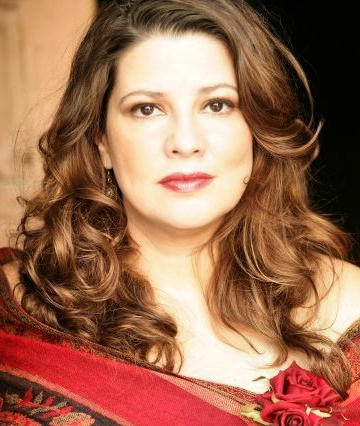Soprano Areyzaga warms up a rainy night in Chicago Ensemble opener

How many people are going to come out on a windy, rainy night to hear three obscure chamber trios and a contemporary vocal cycle of twenty songs based on ancient Korean texts?
If that group is the Chicago Ensemble, you’d be surprised. Gerald Rizzer’s hardy chamber series drew an impressive audience for such a meteorologically challenged night to open its 39th season at Fourth Presbyterian Church.
No chamber series in town roves as widely nor as adventurously, and so it proved again with Tuesday evening’s generous program sparked by soprano Michelle Areyzaga, who led off the concert with a rarity by Meyerbeer.
The clear inspiration for Hirtenlied is Schubert’s Shepherd on the Rock, also scored for soprano, clarinet and piano. If Meyerbeer’s version is less melodically indelible, his setting offers well-balanced opportunities for voice and clarinet. With Rizzer lending discreet piano support, Areyzaga and clarinetist Elizandro Garcia-Montoya were a wonderfully simpatico duo, exchanging phrases gracefully, the soprano singing with pure tone and Garcia-Montoya’s phrasing agile and polished.
Michael-Thomas Foumai’s Songs of the Kisaeng was the main work of the evening. This 2010 song cycle was the winner of the “Discover America” competition, the Chicago Ensemble’s admirable project to promote and perform new chamber works by American composers.
The Hawaii-based Foumai draws on material from Korean folk songs to set twenty poems written by the Kisaeng, esteemed female entertainers similar to the Japanese geishas. The nature imagery of the settings — in an English translation by Jaihiun Joyce Kim — also forms a Romantic arc of sorts, painting first feelings of love to yearning, rejection, anger, abandonment and an uneasy acceptance.
Foumai’s cycle is scored for soprano backed by a quartet of clarinet, violin, cello and piano. Yet the textures are never cloudy or thick and the composer balances the voice and varied instrumental coloring with great skill.
Areyzaga’s performance was extraordinary and a tour de force. With a radiant, evenly produced soprano and crystal-clear diction, she brought to life the passion, melancholy, and wistfulness of these settings, segueing evenly from simple spoken lines to declamation and full-throated vocalism.
Songs of the Kisaeng is an impressive achievement but feels rather lengthy in its present form and a bit repetitive. Some judicious pruning of a few songs could make the work tauter and even more dramatically effective. Foumai was on hand Tuesday to introduce his music and share in the applause with the artists.
Rizzer is adept at unearthing unjustly neglected music and the three trios that made up the non-vocal part of the program all proved worthwhile discoveries.
Ingolf Dahl’s Concerto a Tre led off the evening with violinist Renee-Paule Gauthier and cellist Steven Sigurdson joining Garcia-Montoya. Dahl’s 1947 trio is a deft Neoclassical essay, buoyant and well-contrasted with some cheeky Stravinskian rhythmic curve balls. The easy charm and understated virtuosity of Garcia-Montoya’s clarinet playing was fully in synch with Dahl’s style, though the more emphatic approach of his colleagues lacked a light touch, unaided by repeated bouts of wayward string intonation.
Born in Chicago, Robert Muczynski (1929-2010) studied composition with Alexander Tcherepnin at DePaul University in the late 1940s, later teaching there himself. He moved to Tucson in the 1960s and was composer-in-residence and chairman of the composition department at the University of Arizona until his retirement in 1988.
Muczynski’s oeuvre includes over fifty works, including two symphonies, a piano concerto and a great deal of solo piano music. Based on his Fantasy Trio, it’s hard to understand why this Chicago composer’s music remains so little known. The influence of Leonard Bernstein is fitfully palpable in this four-movement 1969 work for clarinet, cello and piano but Muczynski’s individuality asserts itself strongly as well.
Garcia-Montoya, Sigurdson and Rizzer provided superb advocacy for this music, bringing unbridled energy to the jazzy angularity of the outer sections and distilling a nocturnal urban melancholy in the slow movement. The closing pages were exhilarating sparked by Rizzer’s bravura keyboard work.
The evening ended with Frank Bridge’s Phantasie Trio for violin, cello and piano. The English composer’s 1907 trio is cast in a lush, unapologetic Late Romantic style with big, surging melodies boldly presented.
At times one wanted a bit more of the music’s fantasy and a less strenuous approach, but Gauthier, Sigurdson and Rizzer largely succeeded in making a case, with a ripely impassioned performance that brought out Bridge’s rich lyricism.
The program will be repeated 3 p.m. Sunday at the University of Chicago’s International House in Hyde Park. chicagoensemble.org.
Posted in Uncategorized




